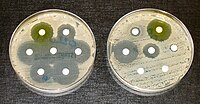
Photo from wikipedia
Background Inappropriate use of antibiotics is a major cause of antimicrobial resistance (AMR). Inadequate knowledge about AMR among healthcare students could affect their practice of antimicrobial stewardship as future healthcare… Click to show full abstract
Background Inappropriate use of antibiotics is a major cause of antimicrobial resistance (AMR). Inadequate knowledge about AMR among healthcare students could affect their practice of antimicrobial stewardship as future healthcare professionals. This study aims to assess the use of antibiotics and knowledge of AMR among future healthcare professionals of a Nigerian University. Methods Respondents’ knowledge of antimicrobial resistance, use of antibiotics, and source of antibiotics in the past 12 months was explored using a self-administered questionnaire. Multivariate analyses were used to evaluate the relationship between specific variables and respondents’ knowledge. Results Of the 939 questionnaires administered to the students, 866 were filled given a response rate of 92.2 %. A total of (765; 88.3 %) of the respondents were aware that antimicrobial resistance makes it harder to eliminate the infection from the body as existing drugs become less effective. In all 824, (95.2 %) of the respondents had use antibiotics in the past 12 months. The use of antibiotics to treat malaria was self-reported by (175; 21.2 %). About half (432; 52.4 %) purchased the antibiotics from community pharmacies, while others obtained their antibiotics from the hospitals (192; 23.3 %), patent medicine stores (150; 18.2 %), and friends and family (50; 6.1 %) in the last 12 months. In all 506, (58.4 %) had good knowledge of antimicrobial resistance. Logistic regression shows that students in 3rd to 6th year 9.29 [AOR = 9.29, 95 % CI: (3.7–22.96)], had greater knowledge of antimicrobial resistance. Conclusions The healthcare students demonstrated a moderate knowledge of AMR. This underscores the need to adopt several educational tactics to introduce the concepts of AMR to the students and ensure there are strict policies to regulate the flow of antibiotics.
Journal Title: BMC Medical Education
Year Published: 2021
Link to full text (if available)
Share on Social Media: Sign Up to like & get
recommendations!